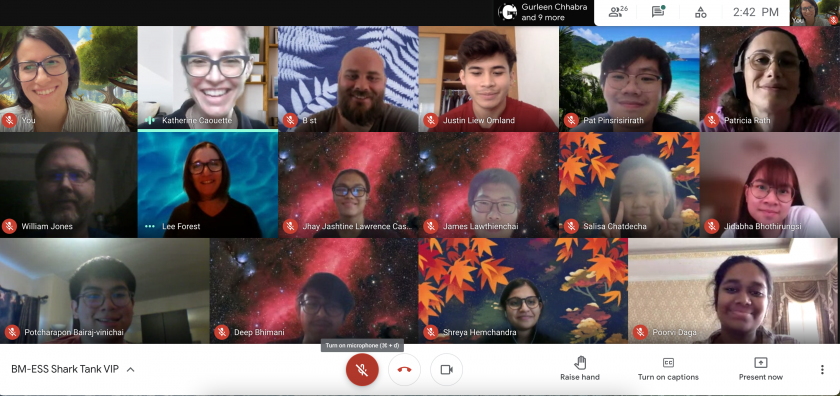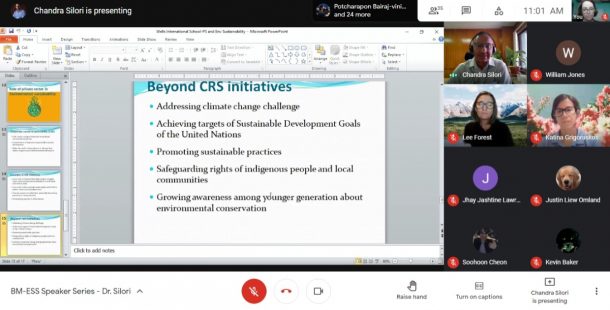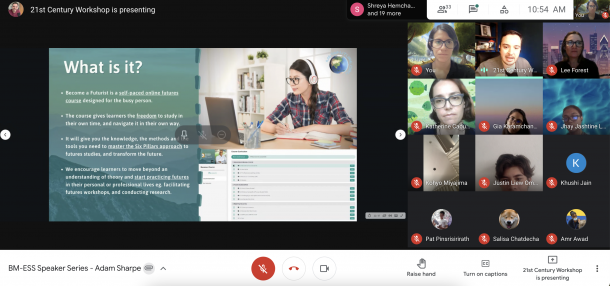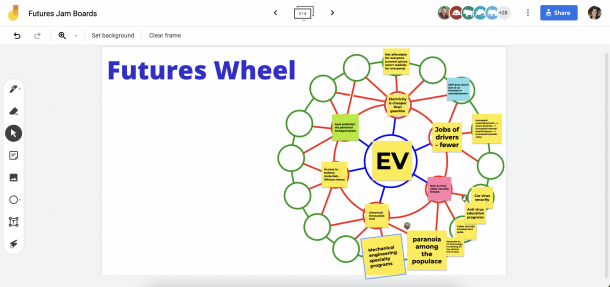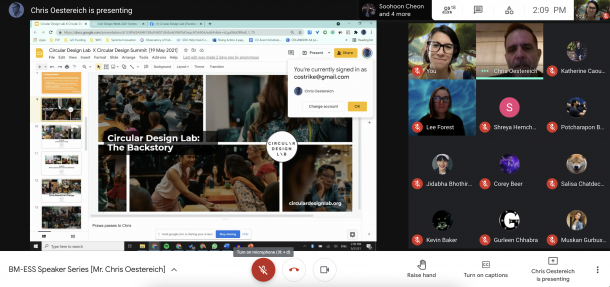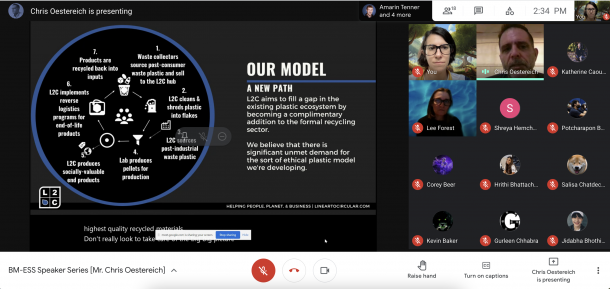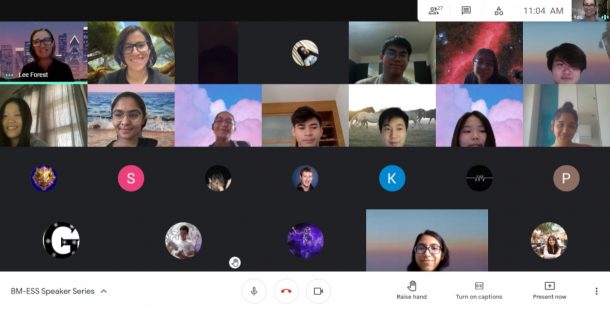Speaker Series
During the final months of semester 2, Environmental Systems and Societies (IB ESS) and Business Management (IB BM) teachers collaborated to bring in a series of guest speakers focusing on innovation and sustainability, part of the final senior projects for the grade 12 classes. Since the pandemic limited field trip opportunities, we brought the world to the students through this series, focused on shared concepts from business and environmental studies from both IBDP subjects.
The inspiration for the event began when Dr. Ahmad, an associate professor of Development and Sustainability at the Asian Institute of Technology, within School of Environment, Resources and Development, came in to speak with the ESS class on his expertise “Adaptation Technologies for Climate Change: Some Solutions” in our Wells auditorium on March 3rd, 2021. ESS students were wrapping up their climate change forum, and Dr. Ahmad brought his expertise of SE Asia climate change adaptation projects, providing students with examples of the impact of climate change on local communities and possible solutions. The grade 12 students got a sense of what university lectures might be like, and with the return of online learning in April of 2021 due to COVID restrictions, it was the perfect opportunity to bring in more speakers virtually.
Dr. Silori
The BM/ESS guest speaker series was launched with the first speaker, Dr. Silori, sharing about “Environmental Responsibility of the Private Sector and Businesses”. Dr. Silori is an expert in forestry management, but he also serves as Deputy Executive Director of Regional Community Forestry Training Center for Asia and the Pacific (RECOFTC), a project by the FAO and UN, based here in Bangkok, Thailand. We were delighted by his talk as it peaked students’ interest in the role companies take, large and small, in the environmental impacts of their business practices. Dr. Silori left students with the challenge of what they will do as future business leaders to go beyond social corporate responsibility and incorporate the understanding and importance of the environment into how businesses operate.
When asked to share some of the points they learned from the guest speaker, one student reflected, saying:
“Dr. Silori gave a phenomenal presentation today on the responsibilities of businesses in the private sector…Companies and corporations are shifting their focus towards following CSR, which is amazing! Although, it is not enough. They have to shift their focus and perspective to really achieve sustainability. Why the businesses in the private sector? Because the large ones tend to hold the money and muscle power to do so and be a leader. Raising awareness amongst people of all classes and languages, negotiating terms, educating the upcoming generations, etc. are the steps towards making a real change. As an aspiring entrepreneur, I want to remember these facts and ideas in the future when I have a business of my own.”
Mr. Adam Sharpe
The second guest speaker brought students a taste of futures-thinking thanks to the thoughts shared by Mr. Adam Sharpe, who brought in his expertise in strategy and consulting in the field of futures thinking for students to learn about. Mr. Sharpe co-founded Metafuture School, and has worked on various projects with the Asian Development Bank, the British Council, and the United Nations (UN). The goal of Metafuture School is to provide a space for young people to engage in 21st century skills development, and increase their capacity to meet the changes brought about by various economic, political and demographic shifts the world faces today.
Students engaged in an activity to apply systems thinking tools, and Mr. Sharpe led them through how to use a Futures Wheel. One student reflected:
“In ESS we talk about systems thinking and I think today I was able to understand and apply it. The biggest take-away for me was about the question that I had asked him whether “it is possible to achieve the UN SDGs by 2030?”, after listening to the answer my perspective on the goals had changed. I used to think it was either black or white, yes or no type of question. But after the answer he gave today, made me realize that there is no real scale of measurement taking place for each SDG, it is just a vision and we all are working towards it collaboratively.”
Another student reflected that:
“…the most important takeaway of the speaker session today was to know that the the future is uncertain, and the best way to deal with that uncertainty is to come up with several scenarios of the future, the possibilities of what can happen and what solutions can we come up with in the event that these scenarios come into play…we have to consider the effects that the future scenarios had on STEEP… Social, Technological, Economic, Ecology, and Political, which are concepts that not only encompass the …BM and ESS subjects, but encompass all of human lives.”
Mr. Chris Oestereich
The final speaker for the BM/ESS collaboration was Mr. Chris Oestereich, who leads Linear to Circular, a consulting firm that assists organizations with the transition towards the circular economy — developing waste to value products like handbags, eyeglass frames, and 3D printing filament. The BM/ESS classes had just completed their final collaborative project designing products for a circular economy and so it was a great link to see the similarities in the speaker’s work and the various student projects. Mr. Oestereich shared about his work as a co-founder of the Circular Design Lab and as publisher of the Wicked Problems Collaborative, an independent press that tackles humanity’s biggest challenges. Students also got the sense of what university lectures can be like, since he is also an adjunct professor at Thammasat University’s School of Global Studies in the Social Enterprise program teaching courses related to social innovation, sustainability, and advocacy. Students were glad to hear from an expert in the field after their own trials and efforts in designing for the circular economy.
Some reflections students had included:
“After listening to his projects I started thinking about how items in my room, my kitchen and the environment could be something better and help others when reused instead of being thrown away and burnt or thrown into the landfill or anything. Next time I buy things I will definitely start thinking about how the items that I buy could be reused…”
“For today’s speaker series, we talked about the Systems Thinking approach. It is a very interesting concept and Mr. Chris’ knowledge of sustainability and different types of approaches within the systems thinking really helped me see the bigger picture and was a perfect ending to our ESS class…The idea I got from his talk today was to look at things from a holistic perspective and see how everything is connected. I would once again like to thank Mr. Chris for joining us today and giving his precious time to teach us something new and meaningful.”
Special Thanks
Yes, indeed! We are grateful to all the speakers for their willingness to give their time and share their wisdom and expertise within their fields of study. This experience provided students real-life connections with the syllabi from their IB BM and IB ESS courses. Despite the challenges these students face during this extended pandemic, the insights from these speakers may have left them with a spark to go out and make a difference in the world, one student at a time.
Written By: Ms. Katherine Caouette, IB Environmental Systems & Societies (ESS) Teacher
